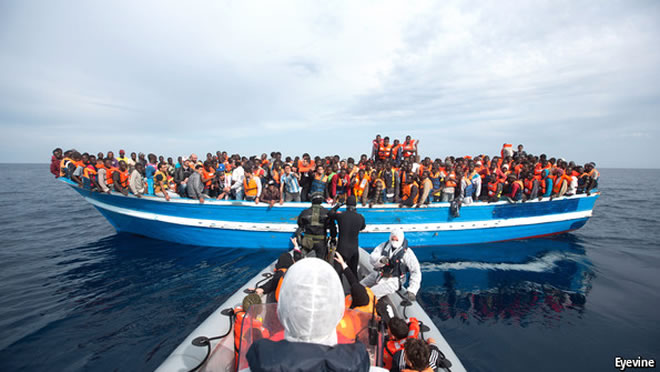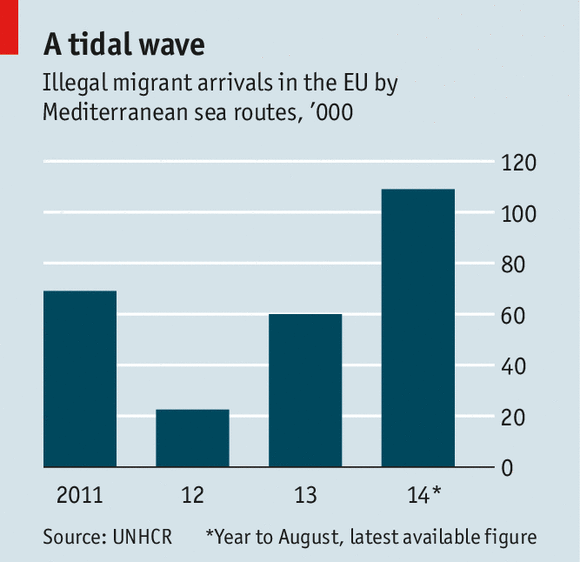ANOTHER weekend, another two thousand-odd immigrants rescued by Italian sailors and coastguards in the Mediterranean. On August 11th the San Giusto, an amphibious transport vessel, landed 1,698 people in Reggio Calabria, a city in southern Italy. The day before, a naval patrol vessel and a frigate disembarked 364 people at ports in eastern Sicily.
The number of people arriving in Italy by sea this year may already exceed 100,000. By the end of July approximately 93,000 migrants had been rescued. The previous record for an entire year was set in 2011 when around 60,000 people reached Italian shores at the height of the Arab Spring.
The sudden jump in arrivals is related to turmoil in Libya, from where most of the migrant-trafficking vessels depart. Another reason is the Italian government’s maritime search-and-rescue operation, Mare Nostrum, launched last October after 368 Eritreans and others drowned off the island of Lampedusa. The prospect of being picked up by the Italian navy has made the journey on an overloaded and often barely seaworthy vessel seem less scary.
 |
| CLICK MAP to ENLARGE |
Grumbling among right-wing lawmakers apart, public and media reaction to the upsurge has been surprisingly muted. Stories of vessels entering Italian waters with four-figure human cargoes, which would have been front-page news a year ago, now barely warrant a mention.
Even so, the Italians need help. Thanks partly to the Dublin regulation, which says that the first European Union state where a migrant arrives, his finger prints are stored or an asylum claim is made, is responsible for the claimant, Italy is one of the five EU countries that get 70% of all asylum applications (Germany, Sweden, France and Britain are the others). Ministers have repeatedly and fruitlessly sought EU involvement in dealing with the Mediterranean influx. Most recently, the interior minister, Angelino Alfano, proposed that the EU’s border-management agency, Frontex, should take over the running of Mare Nostrum. But Frontex’s operational budget for 2014 is a mere €55.3m ($74m) and Mare Nostrum costs €9m a month.
Moreover, Warsaw-based Frontex is solely focused on border security. In Greece it blocked the land route across the Evros river marking the Greek-Turkish border with a 12km (7.5 miles) metal fence. As a result, a tide of desperate migrants are increasingly using the sea route from Turkey to the eastern Aegean islands, which is shorter than that from northern Africa to Italy, yet full of hazard.Read the rest of the story HERE.
If you like what you see, please "Like" us on Facebook either here or here. Please follow us on Twitter here.





No comments:
Post a Comment